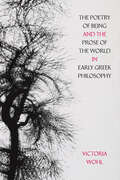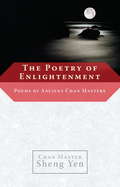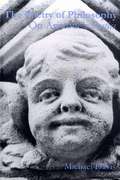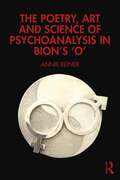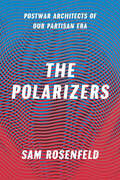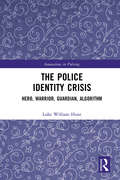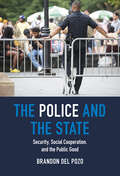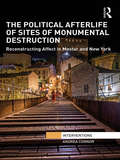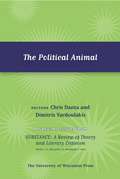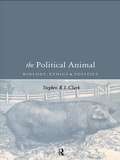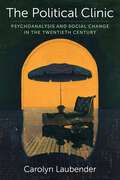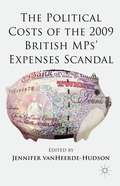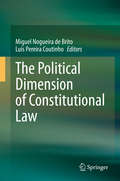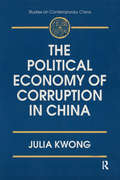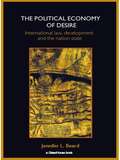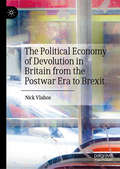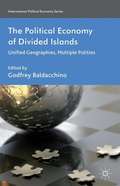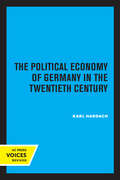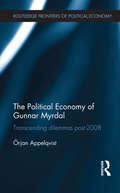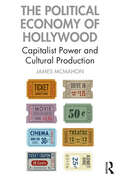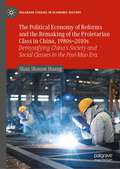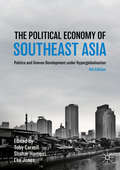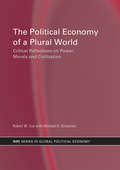- Table View
- List View
The Poetry of Being and the Prose of the World in Early Greek Philosophy (Sather Classical Lectures)
by Victoria WohlA free ebook version of this title is available through Luminos, University of California Press’s Open Access publishing program. Visit www.luminosoa.org to learn more. The Presocratic philosophers, writing in Greece in the sixth and fifth centuries BCE, invented new ways of thinking about human life, the natural world, and structures of reality. They also developed novel ways of using language to express their thought. In this book, Victoria Wohl examines these innovations and the productive relation between them in the work of five figures: Parmenides, Heraclitus, Empedocles, Anaxagoras, and Democritus. Bringing these thinkers into conversation with modern critical theorists on questions of shared concern, Wohl argues for the poetic sophistication of their work and the inextricable convergence of their aesthetic form and philosophical content. In addition to offering original readings of these fascinating figures and robust strategies for interpreting their fragmentary, rebarbative texts, this book invites readers to communicate across entrenched divisions between literature and philosophy and between antiquity and modernity.
The Poetry of Enlightenment: Poems by Ancient Chan Masters
by Master Sheng YenFor the masters of the Chan tradition, poetry was a form of creative expression, but even more than that, it was a primary vehicle for teaching. Here a modern master presents ten teaching poems from the ancient masters, with illuminating commentary. "These poems flow directly from the minds of the enlightened Chan masters," Master Sheng Yen says. "We get a glimpse into their experience at the time of, and after, their enlightenment. It is my hope that this collection of poems will give those who are interested in the practice a new way of looking at Chan."
The Poetry of Philosophy: On Aristotle's Poetics
by Michael DavisAlthough Aristotle's Poetics is the most frequently read of his works, philosophers and political theorists have, for the most part, left analysis of the text to literary critics and classicists. In this book Michael Davis argues convincingly that in addition to teaching us something about poetry, Poetics contains an understanding of the common structure of human action and human thought that connects it to Aristotle's other writings on politics and morality. Davis demonstrates that the duality of Poetics reaches out to the philosopher, writer, and political theorist and shows the importance of the ideal in our imaginings of and goals for the future.
The Poetry, Art and Science of Psychoanalysis in Bion's O
by Annie ReinerThe Poetry, Art and Science of Psychoanalysis in Bion’s ‘O’ pays homage to Wilfred Bion’s lifelong love of poetry and his desire to integrate it with his psychoanalytic work as a means of communicating profound levels of emotional experience. Annie Reiner was a student of Bion in in the 1970s in Los Angeles. She illustrates here the fundamental similarities in the states of mind of creative people across diverse disciplines in the Arts and Sciences to exemplify Bion’s concept of ‘O’. Reiner, herself a poet and artist, shows how psychoanalysis and poetry rely on the same tools – symbols, metaphors, images and narrative – to communicate and express otherwise inexpressible metaphysical matters of mental life. Focusing on key psychoanalytic ideas, such as dream interpretation and trauma, she weaves in the poetry of Rumi, Pablo Neruda, Fernando Pessoa and William Blake, and ideas of artists like Matisse, Rothko and Jackson Pollock, as well as ideas of Christian and Hindu mystics to show analysts how creative arts can help them better understand primitive mental life. She shows how examining ideas from other disciplines in the arts, philosophy and religious thought can reveal an underlying unity of our ancient efforts to understand ourselves as human beings.Written in an accessible style and drawing on Reiner’s decades of experience within the creative and psychoanalytic fields, this book is a valuable resource to all analysts in training and practice, as well as those interested in understanding the deeper levels of the mind and emotional life.
The Polarizers: Postwar Architects of Our Partisan Era
by Sam RosenfeldEven in this most partisan and dysfunctional of eras, we can all agree on one thing: Washington is broken. Politicians take increasingly inflexible and extreme positions, leading to gridlock, partisan warfare, and the sense that our seats of government are nothing but cesspools of hypocrisy, childishness, and waste. The shocking reality, though, is that modern polarization was a deliberate project carried out by Democratic and Republican activists. In The Polarizers, Sam Rosenfeld details why bipartisanship was seen as a problem in the postwar period and how polarization was then cast as the solution. Republicans and Democrats feared that they were becoming too similar, and that a mushy consensus imperiled their agendas and even American democracy itself. Thus began a deliberate move to match ideology with party label—with the toxic results we now endure. Rosenfeld reveals the specific politicians, intellectuals, and operatives who worked together to heighten partisan discord, showing that our system today is not (solely) a product of gradual structural shifts but of deliberate actions motivated by specific agendas. Rosenfeld reveals that the story of Washington’s transformation is both significantly institutional and driven by grassroots influences on both the left and the right. The Polarizers brilliantly challenges and overturns our conventional narrative about partisanship, but perhaps most importantly, it points us toward a new consensus: if we deliberately created today’s dysfunctional environment, we can deliberately change it.
The Police Identity Crisis: Hero, Warrior, Guardian, Algorithm (Innovations in Policing)
by Luke William HuntThis book provides a comprehensive examination of the police role from within a broader philosophical context. Contending that the police are in the midst of an identity crisis that exacerbates unjustified law enforcement tactics, Luke William Hunt examines various major conceptions of the police—those seeing them as heroes, warriors, and guardians. The book looks at the police role considering the overarching societal goal of justice and seeks to present a synthetic theory that draws upon history, law, society, psychology, and philosophy. Each major conception of the police role is examined in light of how it affects the pursuit of justice, and how it may be contrary to seeking justice holistically and collectively. The book sets forth a conception of the police role that is consistent with the basic values of a constitutional democracy in the liberal tradition. Hunt’s intent is that clarifying the police role will likewise elucidate any constraints upon policing strategies, including algorithmic strategies such as predictive policing. This book is essential reading for thoughtful policing and legal scholars as well as those interested in political philosophy, political theory, psychology, and related areas. Now more than ever, the nature of the police role is a philosophical topic that is relevant not just to police officials and social scientists, but to everyone.
The Police and the State: Security, Social Cooperation, and the Public Good
by Brandon del PozoAs we wrestle with the role and limits of policing, a political philosopher who spent over two decades as a New York City police officer and Vermont chief of police presents a normative account of what it means to police a pluralist democracy. Invoking his vast experience, Brandon del Pozo argues that we all have the prerogative to use force to protect others, but police embody the government's unique duty to do so effectively and with restraint. He recasts order maintenance as brokering and enforcing the fair terms of social cooperation in our public spaces, for the protection of minority interests, and for a society where diverse conceptions of the good can flourish. The reasons why we police, he says, must be ones that all citizens can evaluate as equals. His book explains the democratic commitments of policing, and lays the groundwork for meaningful police innovation and reform.
The Political Afterlife of Sites of Monumental Destruction: Reconstructing Affect in Mostar and New York (Interventions)
by Andrea ConnorWhat happens when a monumental thing is physically destroyed? Is its "life" as a socially significant, presencing thing at an end? Or might the process of destruction work to enhance its symbolic force, mediating work and presencing power? In this book Andrea Connor traces the ‘afterlife’ of two exemplary examples of monumental destruction and their re-investment with cultural value and symbolic significance. In 1993, during the Bosnian war, the Mostar Bridge was completely destroyed. Reconstructed in 2004, as an exact copy of the original, this "new Old Bridge" has assumed an afterlife as an intentional monument to reconciliation. The World Trade Centre, in New York, has also been transformed since its destruction in 2001, as a place of national mourning and remembrance, a symbolic void marking a singular act of terrorism. Using recent work on affect and object agency Connor considers their contested reconfiguration as sites of collective remembering and forgetting in new highly charged political contexts. She argues for a more expansive notion of reconstruction – encompassing not only the material and symbolic afterlife of both things but also their affecting afterlives as they are re-assembled in the present. Provoking a reconsideration of the way monuments and heritage sites, even in their absence, become powerful agents of historical narrativization, this work will be of interest to students and scholars in a range of fields including international relations, cultural studies, critical heritage studies, and material culture studies.
The Political Animal
by Chris DantaIn the variegated history of the philosophical definitions of man, one has survived since it has been given the status of the self-evident. The definition in question comes from Aristotle’s Politics: “the human is a political animal” (1253a3). There is something indisputable about this characterization: humans are, indeed, the most social of animals – they are denizens of the polis with its institutions and laws, its rulers, judges and generals. It would be difficult to contend that any other animal has recourse to the political as much as the human. Aristotle’s Politics need not be surrendered to the strictures of humanism. It remains amenable to the new schema for the political animal that we are sketching here. Each article collected in this issue responds – in its own way and by establishing its own protocols – to the exigency of the animal as it was formulated in Aristotle’s Politics. Each article is an act of response, a moment of interruption.
The Political Animal: Biology, Ethics and Politics
by Stephen R Clark Stephen R.L ClarkPeople, as Aristotle said, are political animals. Mainstream political philosophy, however, has largely neglected humankind's animal nature as beings who are naturally equipped, and inclined, to reason and work together, create social bonds and care for their young. Stephen Clark, grounded in biological analysis and traditional ethics, probes into areas ignored in mainstream political theory and argues for the significance of social bonds which bypass or transcend state authority. Understanding the ties that bind us reveals how enormously capable we are in achieving civil order as a species. Stephen Clark advocates that a properly informed political philosophy must take into account the role of women, children, animals, minorities and the domestic virtues at large. Living and comnducting our political lives like the animals we are is a more congenial prospect than is usually supposed.
The Political Clinic: Psychoanalysis and Social Change in the Twentieth Century (New Directions in Critical Theory #94)
by Carolyn LaubenderFor decades, psychoanalysis has provided essential concepts and methodologies for critical theory and the humanities and social sciences. But it is also, inseparably, a clinical practice and technique for treatment. In what ways is clinical practice significant for critical thought? What conceptual resources does the clinic hold for us today?Carolyn Laubender examines cases from Britain and its former colonies to show that clinical psychoanalytic practice constitutes a productive site for novel political thought, theorization, and action. She delves into the clinical work of some of the British Psychoanalytic Society’s most influential practitioners—including Anna Freud, Melanie Klein, Wulf Sachs, D. W. Winnicott, Thomas Main, and John Bowlby—exploring how they developed distinctive and politically salient practices. Laubender argues that these figures transformed the clinic into a laboratory for reimagining race, gender, sexuality, childhood, nation, and democracy. By taking up the clinic as both a site of inquiry and realm of theoretical innovation, she traces how political concepts such as authority, reparation, colonialism, decolonization, communalism, and security at once informed and were reformed by each analyst’s work.While psychoanalytic scholarship has typically focused on its intellectual, social, and political effects outside of the clinic, this interdisciplinary book combines history with feminist and decolonial social theory to recast the clinic as a necessarily politicized space. Challenging common assumptions that psychoanalytic practice is or should be neutral, apolitical, and objective, The Political Clinic also considers what progressive clinical praxis can offer today.
The Political Construction of Business Interests
by Cathie Jo Martin Duane SwankMany societies use labor market coordination to maximize economic growth and equality, yet employers' willing cooperation with government and labor is something of a mystery. The Political Construction of Business Interests recounts employers' struggles to define their collective social identities at turning points in capitalist development. Employers are most likely to support social investments in countries with strong peak business associations, that help members form collective preferences and realize policy goals in labor market negotiations. Politicians, with incentives shaped by governmental structures, took the initiative in association-building and those that created the strongest associations were motivated to evade labor radicalism and to preempt parliamentary democratization. Sweeping in its historical and cross-national reach, the book builds on original archival data, interviews and cross-national quantitative analyses. The research has important implications for the construction of business as a social class and powerful ramifications for equality, welfare state restructuring and social solidarity.
The Political Costs of the 2009 British MPs� Expenses Scandal: Doing Time, Doing Freedom (Palgrave Studies in Prisons and Penology)
by Jennifer Vanheerde-HudsonThis study examines the evolution and political consequences of the 2009 British MPs' expenses scandal. Despite claims of a revolution in British politics, we show how the expenses scandal had a limited, short-term impact.
The Political Dimension of Constitutional Law
by Luís Pereira Coutinho Miguel Nogueira de BritoThis book discusses in what sense constitutional law has a political dimension, raising the question whether constitutional law is fundamentally political as to its validity, terms of its origin, conceptual structure and/or corresponding practice. It also poses the question whether that dimension is a political-theological dimension. A positive answer to these questions challenges the prevailing view that constitutional law is to be conceived strictly as law, moreover as written law, approved at a certain point in history by a particular power and interpreted as any other law by the judiciary. The essays included in this book, written by leading scholars in constitutional theory – including Martin Loughlin, Paul Kahn, Manon Altwegg-Boussac and Massimo La Torre – address these questions in a timely and original way.
The Political Economy of Corruption in China (Studies On Contemporary China)
by Julia KwongThis text examines all facets of corruption: meaning, incidence, monetary value, the kinds of goods exchanged, the perpetrators and their strategies, in China since 1949. It explores the irony of how ideology and organizational structures under socialism can both restrain and encourage corruption.
The Political Economy of Desire: International Law, Development and the Nation State
by Jennifer BeardContaining the best interdisciplinary work in international law, this book offers an intelligent and thought-provoking analysis of the genealogy of Western capitalist ‘development’. Putting forth ground-breaking arguments and challenging the traditional boundaries of thinking about the concept of development and underdevelopment, it provides readers with a new perspective on the West's relationship with the rest of the world. With Jennifer Beard’s departure from the common position that development and underdevelopment are conceptual outcomes of the Imperialist era, The Political Economy of Desire positions the genealogy of development within early Christian writings in which the Western theological concepts of sin, salvation and redemption are expounded. Drawing upon legal theory, anthropology, economics, historiography, philosophy of science, theology, feminism, cultural studies and development studies the author explores: the link between the writings of early theologians and the processes of modern identity formation – tracing the concept of development to a particularly Christian dynamic how the promise of salvation continues to influence Western ontology. An innovative and topical work, this volume is an essential read for those interested in international law and socio-legal theory.
The Political Economy of Devolution in Britain from the Postwar Era to Brexit
by Nick VlahosThis book examines the political economy of devolution in Britain from the postwar period to the present. It situates devolution in Britain within an understanding of the partisan recalibration of political, economic and democratic scales (or levels) of the state. The author utilizes various explanatory tools to unpack complex social, economic, spatial and political phenomena across national, regional and local scales. The book further contributes to our conceptual understanding of decentralization as a broader, comparative, phenomenon. Particular emphasis is placed on examining why decentralization and devolution occur at particular points in time, which enables the investigation into how political and fiscal powers are (re)organized at different levels of the state.
The Political Economy of Divided Islands
by Godfrey BaldacchinoThe authors investigate the exceptional political economy of the ten inhabited islands whose territory is divided amongst two or more countries: that are unitary geographical spaces but fragmented polities.
The Political Economy of Germany in the Twentieth Century
by Karl HardachThis title is part of UC Press's Voices Revived program, which commemorates University of California Press’s mission to seek out and cultivate the brightest minds and give them voice, reach, and impact. Drawing on a backlist dating to 1893, Voices Revived makes high-quality, peer-reviewed scholarship accessible once again using print-on-demand technology. This title was originally published in 1980.
The Political Economy of Gunnar Myrdal: Transcending Dilemmas Post-2008 (Routledge Frontiers of Political Economy)
by Örjan AppelqvistThe intellectual trajectory of Gunnar Myrdal, Swedish Nobel Laureate economist, sociologist, and politician, brings us through many of the major issues in the world economy and politics of the 20th century. This new volume explores Myrdal's work on three major themes: breaking away from conventional assumptions in Political Economy (and highlighting flaws that can still be found in today’s teachings on Political Economy); finding ways of re-creating Europe after WW II, including the discussions between liberal Americans and European social democrats on how to create a more cooperative and socially just international order; and understanding the impact or environmental concerns on growth and development, starting with Myrdal’s participation in the first UN Conference on Environment in Stockholm 1960 and continuing with his later writings. What is then the relevance of these themes today? In times when financial crisis threatens to block international and domestic economies, when the European Union’s promises of prosperity and cooperation seems to be severely threatened and when there is a large consensus that current modes of economic development are ecologically unsustainable: can we find ways of transcending seemingly intractable dilemmas? These questions will be discussed in the final part of the book.
The Political Economy of Hollywood: Capitalist Power and Cultural Production
by James McMahonIn Hollywood, the goals of art and business are entangled. Directors, writers, actors, and idealistic producers aspire to make the best films possible. These aspirations often interact with the dominant firms that control Hollywood film distribution. This control of distribution is crucial as it enables the firms and other large businesses involved, such as banks that offer financing, to effectively stand between film production and the market. This book analyses the power structure of the Hollywood film business and its general modes of behaviour. More specifically, the work analyses how the largest Hollywood firms attempt to control social creativity such that they can mitigate the financial risks inherent in the art of filmmaking. Controlling the ways people make or watch films, the book argues, is a key element of Hollywood’s capitalist power. Capitalist power—the ability to control, modify, and, sometimes, limit social creation through the rights of ownership—is the foundation of capital accumulation. For the Hollywood film business, capitalist power is about the ability of business concerns to set the terms that will shape the future of cinema. For the major film distributors of Hollywood, these terms include the types of films that will be distributed, the number of films that will be distributed, and the cinematic alternatives that will be made available to the individual moviegoer. Combining theoretical analysis with detailed empirical research on the financial performance of the major Hollywood film companies, the book details how Hollywood’s capitalist goals have clashed with the aesthetic potentials of cinema and ultimately stymied creativity in the pursuit of limiting risk. This sharp critique of the Hollywood machine provides vital reading for students and scholars of political economy, political theory, film studies, and cinema.
The Political Economy of Human Happiness
by Benjamin RadcliffData, methods and theories of contemporary social science can be applied to resolve how political outcomes in democratic societies determine the quality of life that citizens experience. Radcliff seeks to provide an objective answer to the debate between left and right over what public policies best contribute to people leading positive and rewarding lives. Radcliff offers an empirical answer, relying on the same canons of reason and evidence required of any other issue amenable to study through social-scientific means. The analysis focuses on the consequences of three specific political issues: the welfare state and the general size of government, labor organization, and state efforts to protect workers and consumers through economic regulation. The results indicate that in each instance, the program of the Left best contributes to citizens leading more satisfying lives and, critically, that the benefits of greater happiness accrue to everyone in society, rich and poor alike.
The Political Economy of Reforms and the Remaking of the Proletarian Class in China, 1980s–2010s: Demystifying China's Society and Social Classes in the Post-Mao Era (Palgrave Studies in Economic History)
by Shan Shanne HuangThis book comprehensively investigates the position of China’s working class between the 1980s and 2010s and considers the consequences of economic reforms in historical perspective. It argues the case that, far from the illusion during the Maoist period that a new society had been established where the working classes held greater political and economic autonomy, economic reforms in the post-Mao era have led to the return of traditional Marxist proletariats in China. The book demonstrates how the reforms of Deng Xiaoping have led to increased economic efficiency at the expense of economic equality through an extensive case study of an SOE (state-owned enterprise) in Sichuan Province as well as wider discussions of the emergence of state capitalism on both a micro and macroeconomic level. The book also discusses workers’ protests during these periods of economic reform to reflect the reformation of class consciousness in post-Mao China, drawing on Marx’s concept of a transition from a ‘class-in-itself' to a ‘class-for-itself’. It will be valuable reading for students and scholars of Chinese economic and social history, as well as political economy, sociology, and politics.
The Political Economy of Southeast Asia: Politics and Uneven Development under Hyperglobalisation (Studies in the Political Economy of Public Policy)
by Shahar Hameiri Lee Jones Toby Carroll"This is not only the best collection of essays on the political economy of Southeast Asia, but also, as a singular achievement of the “Murdoch School”, one of the rarest of books that demonstrates how knowledge production travels across generations, institutions and time periods, thereby continually enriching itself. No course on Southeast Asia can afford to miss it as its core text." (Professor Amitav Acharya, American University, USA) "This book – the fourth in a path-breaking series – demonstrates why a critical political economy approach is more crucial than ever for understanding Southeast Asia's transformation. Across a wide range of topics, the book explains how capitalist development and globalisation are reshaping the societies, economies and politics of a diverse group of countries, casting light on the deep sources of economic and social power in the region. This is a book that every student of Southeast Asia needs to read." (Professor Edward Aspinall, Australian National University, Australia) "This book does what a work on political economy should do: challenge existing paradigms in order to gain a deeper understanding of the processes of social transformation. This volume is distinctive in three ways. First, it eschews methodological nationalism and focuses on how the interaction of national, regional, and global forces are shaping and reshaping systems of governance, mass politics, economies, labor-capital relations, migration, and gender relations across the region. Second, it is a bold effort to show how the “Murdoch School,” which focuses on the dynamic synergy of internal class relations and global capitalism, provides a better explanatory framework for understanding social change in Southeast Asia than the rival “developmental state” and “historical institutionalist” approaches. Third, alongside established luminaries in the field, it showcases the younger generation of political economists doing pathbreaking work on different dimensions of the political economy of the region." (Walden Bello, State University of New York at Binghamton, USA, and Former Member of the Philippines’ House of Representatives) "This very timely fourth edition explores Southeast Asia’s political economy within the context of hyperglobalisation and China’s pronounced social-structural impacts on international politics, finance and economics over the past decade and a half. The volume successfully adopts a cross-cutting thematic approach, while also conveying the diversity and divergences among the Southeast Asian states and economies. This will be an important resource for scholars of International Relations and Comparative Politics, who need to take an interest in a dynamic and increasingly significant part of Asia." (Professor Evelyn Goh, Australian National University, Australia) “This ambitious collection takes a consistent theoretical approach and applies it to a thematic, comparative analysis across Southeast Asia. The yield is impressive: the social, political and economic forces constituting the current conjuncture are not simply invoked, they are thoroughly identified and explained. By posing the deceptively simple questions of what is happening and why, the authors demonstrate the reciprocal relation between theory-building and empirical inquiry, providing a model of engaged scholarship with global resonance. Bravo!" (Professor Tania Li, University of Toronto, Canada) "Counteracting the spaceless and flattened geography of much literature on uneven development, this book delivers a forensic examination of the unevenness of geographical development in Southeast Asia and the relations of force shaping capital, state, nature and civil society. This is the most compelling theoretical and empirical political economy book available on Southeast Asia." (Professor Adam David Morton, University of Sydney, Australia) "A vital book for all scholars, students and practitioners concerned with political economy and development, this volume combines cutting-edge theory with
The Political Economy of a Plural World: Critical reflections on Power, Morals and Civilisation (RIPE Series in Global Political Economy)
by Michael G. Schechter Robert CoxBuilding on his seminal contributions to the field, Robert W. Cox engages with the major themes that have characterized his work over the past three decades, and the main topics which affect the globalized world at the start of the twentieth-century. This new volume by one of the world's leading critical thinkers in international political economy addresses such core issues as global civil society, power and knowledge, the covert world, multilateralism, and civilizations and world order. With an introductory essay by Michael Schechter which addresses current critiques of Coxian theory, the author enters into a stimulating dialogue with critics of his work.Timely, provocative and original, this book is a major contribution to international political economy and is essential reading for all students and academics in the field.
